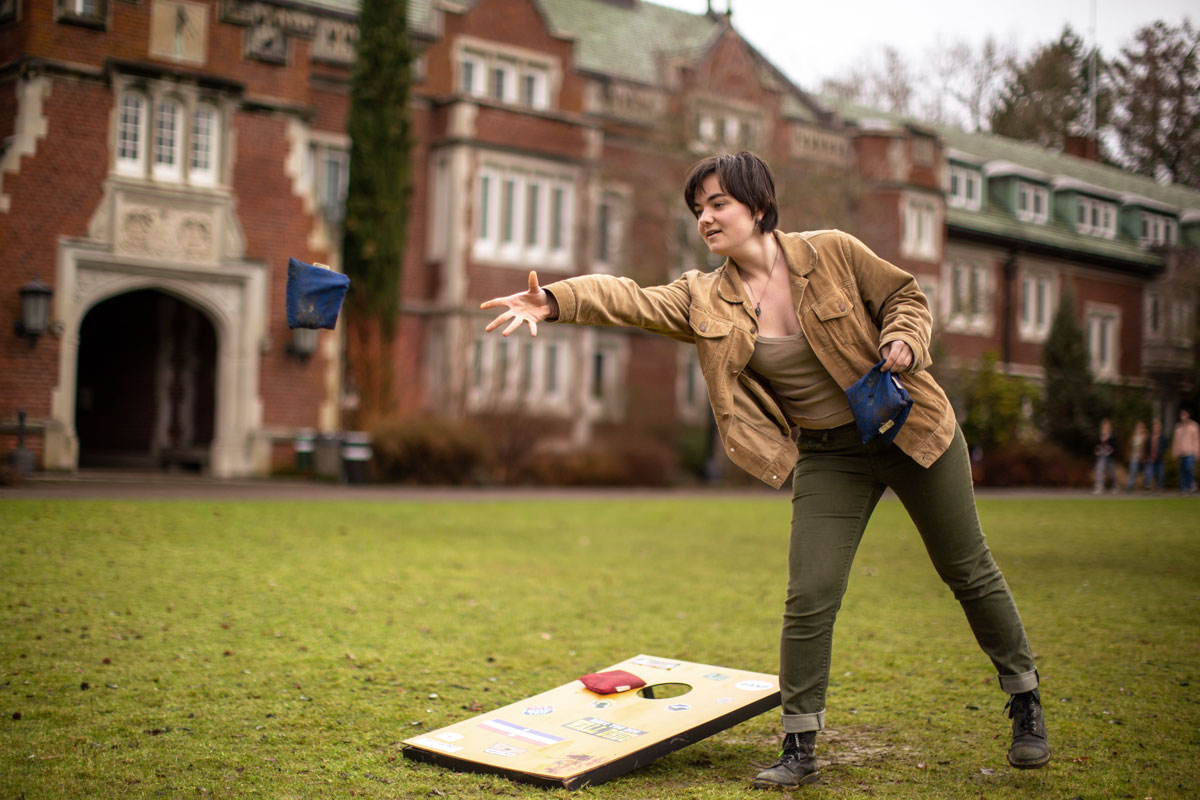A Cross-Country Cornhole Trip Digs into American Identity
Anthropology major Emilie Kelly ’25 used a classic lawn game to break the ice before entering into deeper conversation.
The Grand Trans-American Cornhole Quest began as a bucket list dream. It was 2017 and Emilie Kelly ’25, then a high school sophomore, was attempting to make sense of the prevailing national narrative of America as hopelessly divided. It was a terrifying notion, she says, but more than that, she found herself questioning its accuracy.
“The majority of the information I was getting about walks of life other than my own was coming from secondhand sources,” says Emilie, who grew up outside New York City in suburban Westchester County. “I was like, it can’t be like what I’m hearing from the news.”
Emilie imagined traveling the country, meeting strangers, and engaging them in conversation about what it means to be an American—all while playing a classic lawn game. Last summer, with support from the President’s Summer Fellowship (sponsored by Dan Greenberg ’62 and Susan Steinhauser), that vision became reality in the form of a seven-week-long voyage that spanned 32 states, 15,000 miles, and 106 (completed) rounds of cornhole. With a borrowed camcorder and friends-turned-film crew—including Lane Devers ’25 and Joseph Tally ’25—Emilie collected more than 24 hours of footage, which last semester she cut into a thoughtful 85-minute documentary available on YouTube.
Goofy? That was kind of the point. Emilie, an anthropology major, had always wanted a game to be part of the project, and she suspected cornhole would disarm strangers and help break the ice. Her instinct was shored up while in class with Prof. Paul Silverstein [anthropology], who introduced her to the work of Charles Briggs, an anthropologist who has encouraged researchers to consider the “local metacommunicative repertoire”—in other words, to pay attention to which social situations are appropriate for interviewing. Not only would flinging bean bags give people’s hands something to do, playing a familiar game would set them at ease as they answered questions about community, home, and identity.
Over the course of the interviews—152 of them, with 215 people—themes emerged. Many people felt proud or privileged to be an American. But just as many felt shame or embarrassment, didn’t feel like an American, or found the question too knotted in paradox to answer. Emilie says she got along with everyone she met, but at times still felt like she “was doing foreign exchange.” How could she square such disparate perspectives? Late in the journey, driving through the Southwest and “listening to NPR and TED Talks and trying to understand the entirety of American history,” she found herself exhausted and overwhelmed by the enormity of the challenge.
And then beauty intervened. Emilie pulled into Arches National Park as the sun was sinking. Rain had just rinsed the sky clean, and a double rainbow formed over the desert landscape. Maybe, Emilie thought, there is no reconciling of the contradictions of American identity, and maybe that’s OK. “I came away with this sort of poetic take on it, where the shadow is only as dark as the light that shines on it,” Emilie says. “We have to hold juxtaposing, contrasting things. We have to respect both of them, and we have to keep them both with us.”
Tags: Books, Film, Music, Cool Projects, Research, Students
